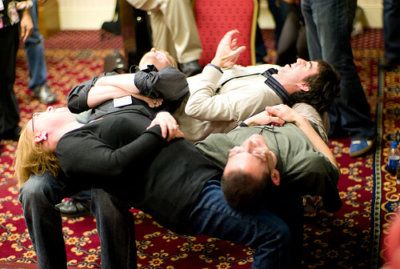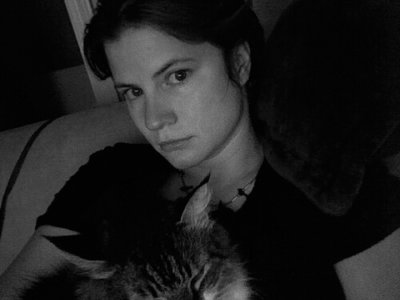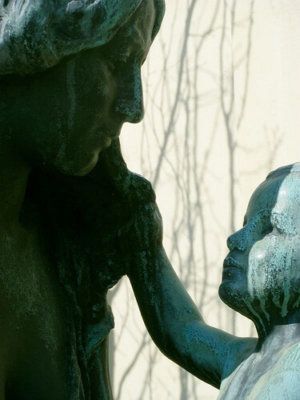Find Trusting Others way too Hard? This Can Help

By: Joi Ito
by Andrea M. Darcy
Do you find that trust just doesn’t come naturally for you? That you feel anxious and paranoid when you try? Or is your ‘trust radar’ all off, meaning you tend to trust the wrong people who inevitably let you down?
How to be better at trusting others
How can you be better at trusting others?
1. Recognise that you already have the capacity to trust.
If you feel that you can’t trust others, it’s often down to a core belief that “trusting others is dangerous”. Core beliefs, ideas we learn as children and mistake for ‘facts’, unconsciously drive all our decisions in life. We tend to make choices to ‘prove’ our beliefs right. In this case, that would look like constantly trusting unreliable people who let you down.
How to break the vicious cycle? Shift your perspective.
Start training your attention to notice each and every way, no matter how small, that you already trust yourself, others, and life. For example, you trust yourself to get out of bed each day, you trust the bus driver to show up and drive on the right side of the road, and you trust the sun to rise and set.
It can seem small and futile – but it isn’t. The more you take note of each little thing that asks for your trust each day, the more you realise you can and do trust, and that your trust does sometimes work out? The more you train your brain to let go of that core belief that you can’t trust at all, and the more you open a doorway for greater experiences of trust.
2.Learn what trust actually is.

By: Erica Firment
If the very word ‘trust’ leaves you feeling completely overwhelmed, it’s probably because you’ve made trust into something other than it really is. Childhood experiences where our trust was broken can lead us to layer our ideas of trust with shame and fear. Or perhaps you watched parents have a relationship that was codependent and grew up thinking these draining experiences are what trust feels like.
Trusting someone does not mean you have to override your own good sense or personal boundaries, even as it also doesn’t mean that someone else must do everything you ask. Trust instead is composed of things like co-operation, compromise, and confidence.
[Read our connected article, ‘What is Trust, Really?’, for a better understanding.]
It can help to take a page from psychological research that decided trust is like an ‘interdependency contract’. You (person A) trust another (person B) to help you attain an outcome (object C), accepting help even as you are independent (can also take care of yourself).
In other words, if you feel overwhelmed by an experience of trust, try to clarify each separate outcome you are working towards with the other person and get there one at a time, instead of trying to trust on too many levels at once. And never, ever lose sight of self care in the process.
3. Work on your self-trust.
An inability to trust often comes from a childhood where you couldn’t rely on the adults around you to love and support you just as you were, meaning you were always striving to be ‘perfect’ to receive love. This of course would involve constantly suppressing your unique personality, meaning you grew up into an adult out of touch with yourself. When you don’t know who you really are, and what truly feels good and bad for you, it can be hard to trust yourself.
Adults who don’t trust themselves can either be codependent or attract partners who replicate their childhood relationships – those who don’t love or support you unless you are ‘good’. Naturally, this can’t lead to a trusting relationship.
Learning to trust yourself — taking time to recognise and support who you really are, and making it a goal to create a life that works for you — is a natural path towards trusting others.
4. Understand attachment theory.

By: jon jordan
Attachment theory believes that the quality of the relationship we had with our first caregiver as infants determines how we relate to others as an adult.
So if your caregiver was reliable, you’ll trust others naturally. If not, you might have patterns of what is called ‘anxious attachment’ or ‘avoidant attachment’, both of which revolve around trust issues.
Understanding the way you ‘attach’ to others can help you understand why you don’t trust easily and what might help you trust more.
[Try reading our article on Attachment Styles in Relationships to learn more.]
5. Work with a counsellor or therapist.
Being unable to trust others can be a symptom of deeper issues. Childhood trauma, for example, is often behind trust issues in adults. This includes experiencing physical abuse and sexual abuse. And challenges around trust are also connected to other issues that include low self-esteem and depression.
Problems understanding trust can also be a sign of a personality disorders. They leave you unable to understand the way others think and act, or just not interested in human connection and trust.
All of the above is hard to deal with alone. A trained and experienced counsellor or psychotherapist can help you understand what has led you to have trust problems as an adult. They can help you build your confidence and self trust, and make decisions that mean trusting relationships have a space in your life at last.
Harley Therapy connects you with highly trained and empathic counsellors and psychotherapists who can help you learn to trust again. If you aren’t within reach of one of our central London locations, we can also connect you with online counsellors who help you wherever you are.
 Andrea M. Darcy is a mental health and wellbeing expert and personal development teacher. With training in person-centred counselling and coaching, she often writes about trauma and relationships. Find her on Instagram @am_darcy
Andrea M. Darcy is a mental health and wellbeing expert and personal development teacher. With training in person-centred counselling and coaching, she often writes about trauma and relationships. Find her on Instagram @am_darcy





This is what I want to read. Thank you very much